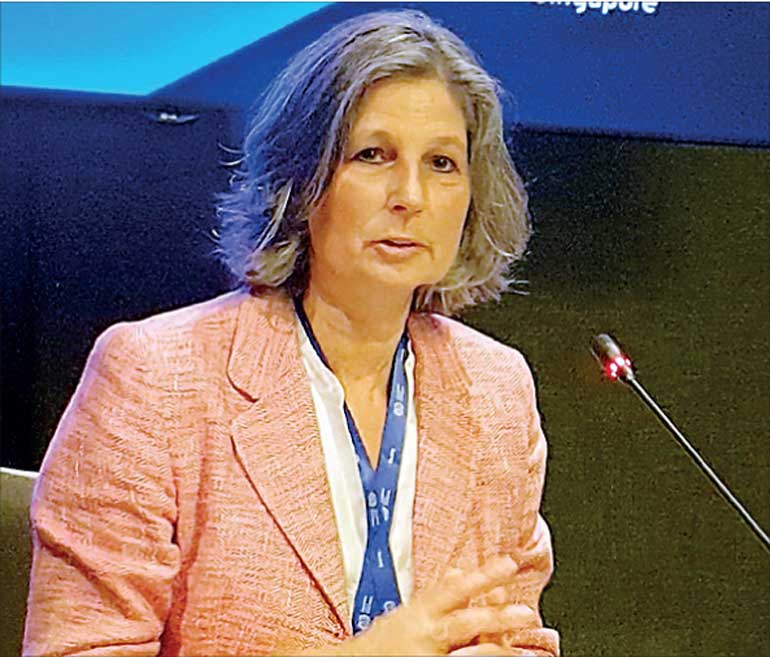Sunday Feb 22, 2026
Sunday Feb 22, 2026
Friday, 9 December 2022 00:23 - - {{hitsCtrl.values.hits}}

ILO Head Multinational Enterprises and Enterprise Engagement Unit Githa Roelans gestures at the media briefing yesterday on the side-lines of the 17th Asia Pacific Regional Meeting in Singapore
The International Labour Organisation (ILO) on Thursday said there is rising interest in Asia Pacific and Arab States to its responsible business agenda and called for greater adaptation to achieve inclusive growth in the region amidst challenges.
On the side-lines of the on-going 17th Asia Pacific Regional Meeting (APRM) in Singapore, the ILO released to the regional media the latest report on the promotion and application of the Tripartite Declaration of Principles concerning Multinational Enterprises and Social Policy in Asia and the Pacific and the Arab States.
Titled “Multinational enterprises, development and decent work”, the report provides elements for consideration regarding the further promotion and application of the Multinational enterprises (MNE) Declaration in Asia and the Pacific and the Arab States.
The MNE Declaration is the only instrument of the ILO that provides direct guidance to enterprises (multinational and national), governments, and employers’ and workers’ organisations on the labour dimension of responsible business conduct.
In that context the ILO expects the report will foster further dialogue among governments, employers, and workers regarding the opportunities and challenges for decent work linked to foreign direct investment and the operations of multinational enterprises at national and regional levels; and facilitate the exchange of experiences and lessons learned.
“The rising interest of constituents in the region in the responsible business agenda has led to an increase in requests for support on the ILO MNE Declaration and how to make better use of this normative instrument in discussions on trade, investment and supply chains, both in home and host countries of MNEs in the region and at the global level,” ILO Head Multinational Enterprises and Enterprise Engagement Unit Githa Roelans told journalists attending the 17th APRM in Singapore including the Daily FT.
She said it was in the interest of the Government of MNC’s home country as well as the Government of the host country of MNC to ensure greater adoption of the MNE Declaration. It was stressed that in times of crisis it makes greater sense to have proper social dialogue to achieve common objectives under a tripartite approach.
‘Whilst governments need to put in place policies conducive for higher FDIs, the MNCs on their part must be better embedded to the local economy,” Roelans added.
The MNE Declaration sets out principles in the fields of employment, training, conditions of work and life, and industrial relations, as well as general policies that governments, employers’ and workers’ organisations, and multinational enterprises (MNEs) are recommended to observe on a voluntary basis.
The aim of the MNE Declaration is “to encourage the positive contribution which multinational enterprises can make to economic and social progress and the realization of decent work for all; and to minimise and resolve the difficulties to which their various operations may give rise.”
ILO said for MNEs, the Asia and the Pacific region is an important destination of international investment. Overall, the region accounted for 40% of global FDI inflows in 2021, which is higher than the share of 36% in 2019, before the pandemic.
The APRM in Singapore yesterday had a dedicated a special session on MNE Declaration featuring experts from Japan, Vietnam and Pakistan. Over 500 delegates including 19 ministers and vice ministers – representing governments, workers’ and employers’ organisations from 33 of the region’s 48 member countries including Sri Lanka attended the meeting.
As per the ILO a significant trend in the Asia Pacific has been the formulation of national action plans (NAPs) on business and human rights or similar national frameworks. NAPs on business and human rights are defined as an “evolving policy strategy developed by a State to protect against adverse human rights impacts by business enterprises in conformity with the United Nations Guiding Principles on Business and Human Rights” (United Nations Working Group on Business and Human Rights 2016).
Thailand adopted its NAP in 2019; Japan launched its NAP in October 2020 and is embarking on the drafting of guidelines for human rights due diligence to help companies detect and prevent human rights violations in their supply chains; and Pakistan launched its NAP in 2021. Other countries, while not having a NAP on business and human rights as such, have sought to include national commitments in this area in related frameworks.
For example, the Republic of Korea adopted a Human Rights National Action Plan containing a chapter on business and human rights in 2018. As in other regions, it is expected that the trend for governments to develop and adopt NAPs will continue.
For the NAP to achieve its objectives, ILO said a broad range of stakeholders, such as ministries of labour and national employers’ and workers’ organisations, need to effectively participate in its development, implementation, evaluation and update. ILO supports this process by providing capacity-building and technical assistance, and making available relevant ILO expertise, products and services during the development, implementation and review stages of the NAP.